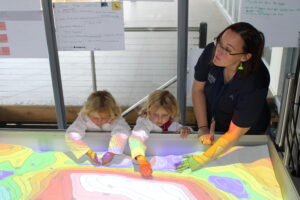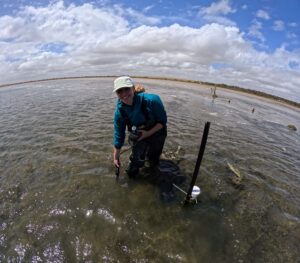The Goyder Institute for Water Research has released a restoration strategy for the Ruppia
community of the Southern Coorong as part of the Healthy Coorong, Healthy Basin (HCHB) program,
which is jointly funded by the Australian and South Australian governments.
Large-scale losses of the Ruppia community throughout the Millennium Drought and the impact of
filamentous algal growth are exacerbating the long-term recovery of the Coorong ecosystem. The
recently published strategy outlines how aquatic plant refugia should be established and restored
across the Coorong to help return seagrasses such as Ruppia to their place as the dominant aquatic
habitat.
Ruppia tuberosa is a keystone species for the Southern Coorong where it co-occurs with another
hypersalinity tolerant macrophyte, Althenia cylindrocarpa. It contributes to maintaining water
quality and trapping sediment while providing habitat for invertebrates and fish, and food for
waterbirds.
Ruppia was the dominant aquatic habitat in the Southern Coorong until increased salinities and
lower water levels observed during the Millennium Drought significantly impacted the distribution
and abundance of the Ruppia community. Since the end of the Millennium Drought in 2010,
excessive filamentous algal growth has negatively impacted the growth and seed production of the
Ruppia community, which is now described as vulnerable.

Mixed species Ruppia community in the Coorong.
Note colonising growth form with rhizomes (white horizontal stems) visible at the
edge of the meadow, filamentous algal tufts already attaching to new plant
structures and a larger clump of algae with plants caught above the main canopy.
Underwater photograph by Ryan Lewis.
Goyder Institute researchers, Professor Michelle Waycott and Dr Ryan Lewis from the University of
Adelaide, developed this restoration strategy to help restore a resilient Ruppia community with
widespread populations of high abundance relative to prevailing conditions. As part of their work, they evaluated Ruppia restoration efforts that took place after the Millennium Drought and outlined
the restoration principles that should guide the new strategy.
Presented as a cycle enabling adaptable delivery, the strategy establishes options to identify
pathways that support restoring the natural values and ecological functions essential for healthy and
productive aquatic macrophyte populations.
Professor Waycott said “The restoration strategy we have developed is bespoke to the exceptional
and unique environment of the Coorong, in particular the Southern Coorong, but it could also be
applied elsewhere.”
“As part of the strategy, we have also described a restoration workflow, which can become the
foundation for an evidence-based monitoring program to inform ongoing management of the
Coorong ecosystem” said Professor Waycott.

Restoration strategy workflow for the Ruppia community in the Coorong
Ultimately the Ruppia restoration strategy can be used to decide if any management interventions
are required at all, and if so, what type of restoration is needed. Using this decision framework,
based on robust ecological knowledge and modelling, it will be possible for managers to predict the
outcomes of any proposed interventions with confidence.
This strategy has helped us understand how management options might limit filamentous algae
distribution and abundance and restore aquatic plant distribution, abundance and resilience.
You can find the full restoration strategy here or contact Goyder Institute Interim Director Dr Alec
Rolston for more information.



